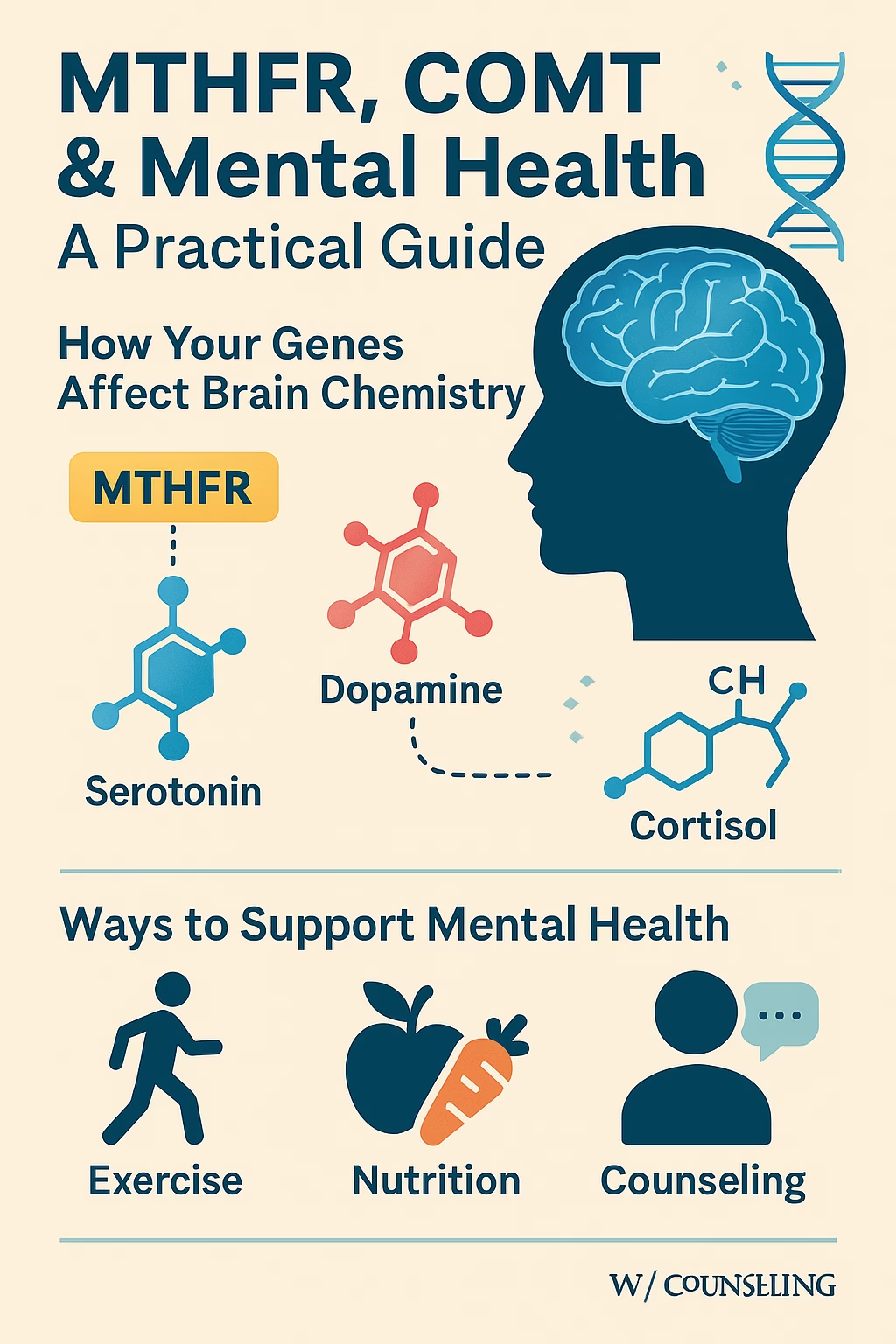MTHFR, COMT & Mental Health: A Practical Guide
MTHFR, COMT, and Mental Health: How Your Genes Shape Brain Chemistry—And What You Can Do About It
By Darin King Counseling LLC — Integrative, evidence-based therapy in Pennsylvania (telehealth available). This article is for educational purposes only and is not medical advice.

TL;DR
Certain genetic variants—especially in MTHFR and COMT—can influence how your body makes and clears neurotransmitters (like serotonin and dopamine), manages stress (like norepinephrine and cortisol), and recycles nutrients (like folate and B12). These differences may contribute to anxiety, depression, ADHD-like symptoms, OCD, or trauma sensitivity. The good news: a whole-person approach—movement, targeted nutrition, and counseling—can help your brain rebalance.
Why MTHFR and COMT Matter
The Methylation Cycle in Plain English
Methylation is a core process that affects brain and body chemistry. It helps build neurotransmitters, repair DNA, support detoxification, and produce antioxidants like glutathione.
- MTHFR helps convert folate into 5-MTHF, the active form needed to create SAMe—a key molecule that donates methyl groups to regulate mood, cognition, and inflammation.
- COMT uses SAMe (with magnesium) to break down excess dopamine, norepinephrine, and epinephrine after stress or stimulation.
Common Genetic Variants
- MTHFR C677T and A1298C: May reduce efficiency. People may need more folate (as 5-MTHF) and B-vitamins to keep methylation functioning well.
- COMT Val158Met:
- Met/Met = Lower COMT activity → Higher dopamine = More focus but greater stress sensitivity, caffeine sensitivity, or mental “noise.”
- Val/Val = Higher COMT activity → Quicker stress chemical clearance but possibly lower drive or attention.
Reminder: These are patterns, not predictions. Environment and lifestyle still play a huge role.
The Brain Chemicals Most Affected
| Molecule | Function | Genetic Influence | Symptoms When Imbalanced | Helpful Supports |
|---|---|---|---|---|
| Serotonin | Mood, sleep, appetite | Needs BH4, folate/B12/B6 | Low mood, irritability, cravings | Protein (tryptophan), 5-MTHF, magnesium, sleep |
| Dopamine | Motivation, focus | COMT clears it; needs SAMe, B6, iron | Apathy, restlessness, poor focus | Tyrosine-rich foods, magnesium, aerobic activity |
| Norepinephrine | Stress, alertness | Made from dopamine, cleared by COMT | Hypervigilance, palpitations | Cardio, breathwork, magnesium glycinate |
| Epinephrine | Acute stress | Cleared by COMT | Panic surges, jitters | Grounding, moderate movement, magnesium |
| GABA | Calming neurotransmitter | Needs B6; impacted by methylation | Overstimulation, poor sleep | P5P, magnesium, mindfulness, breathwork |
| Histamine | Wakefulness, immune response | Deactivated via methylation | Irritability, brain fog, sleep trouble | Vitamin C, hydration, low-histamine diet (if advised) |
| Glutathione | Detox, resilience | Built with cysteine/glycine; supports recovery | Oxidative stress, slow healing | NAC, protein, cruciferous veggies, good sleep |
A Three-Pillar Plan: Exercise, Nutrition, Counseling
1) Move Your Body
- Goal: 150 minutes/week of aerobic activity + 2 strength sessions
- Benefits: improves dopamine/serotonin, clears cortisol & norepinephrine, improves sleep
Quick breath reset:
Inhale through nose (4 sec) → Exhale through mouth or nose (6–8 sec). Repeat for 2–5 minutes to calm the nervous system.
2) Feed the Pathways
Food First:
- Protein-rich meals (for neurotransmitter building blocks)
- Leafy greens, legumes, berries, citrus
- Omega-3s (salmon, walnuts, chia seeds)
- Mineral-rich foods: pumpkin seeds, cacao, beans, dairy
- Hydration: under-hydration = more stress reactivity
Targeted Supplements (with clinician guidance):
- 5-MTHF (start low)
- Methylcobalamin or hydroxy-B12
- P5P (B6), riboflavin (B2)
- Magnesium glycinate or threonate
- TMG (betaine), choline
- NAC, Omega-3 EPA/DHA
- SAMe (if approved by provider)
3) Work the Mind
- IFS (Internal Family Systems) for mapping inner parts & self-regulation
- CBT for intrusive thoughts and behavior loops
- EMDR or somatic therapy for trauma processing
- Sleep coaching: consistent wake time, AM light, caffeine before noon
Starter Plan (2–4 Weeks)
- Wake up same time daily + 10 minutes of sunlight
- 15–25 minutes of light cardio 5–6 days/week
- Lunch = protein + greens
- Snack = nuts + fruit
- Supplements: magnesium glycinate PM + low-dose B-complex with food
- Therapy tool: Daily IFS check-in or CBT journal entry
- Track: Sleep, anxiety, or focus pattern
Important: If you’re pregnant, nursing, taking psychiatric or thyroid meds, or have a chronic condition, consult your provider before changing supplements.
When to Seek Support
- Panic, anxiety surges, or intrusive thoughts
- Sleep loss, mood dips, or hypervigilance
- Supplements make you feel worse
- New neurological changes
We Can Help
At Darin King Counseling LLC, we integrate mental health therapy with a science-backed understanding of brain chemistry. Our team helps you:
- Use IFS, CBT, and trauma-informed care
- Collaborate with your prescribers and wellness team
- Set routines that fit your lifestyle and support recovery
- Access care through telehealth across Pennsylvania
Curious how your genetics might shape your mental health? Let’s build a personalized, supportive plan—together.
